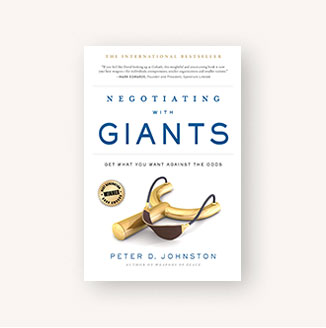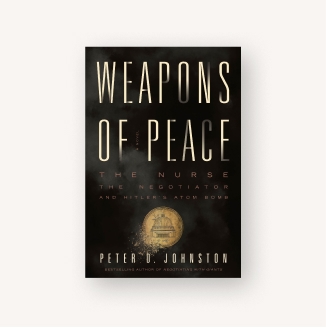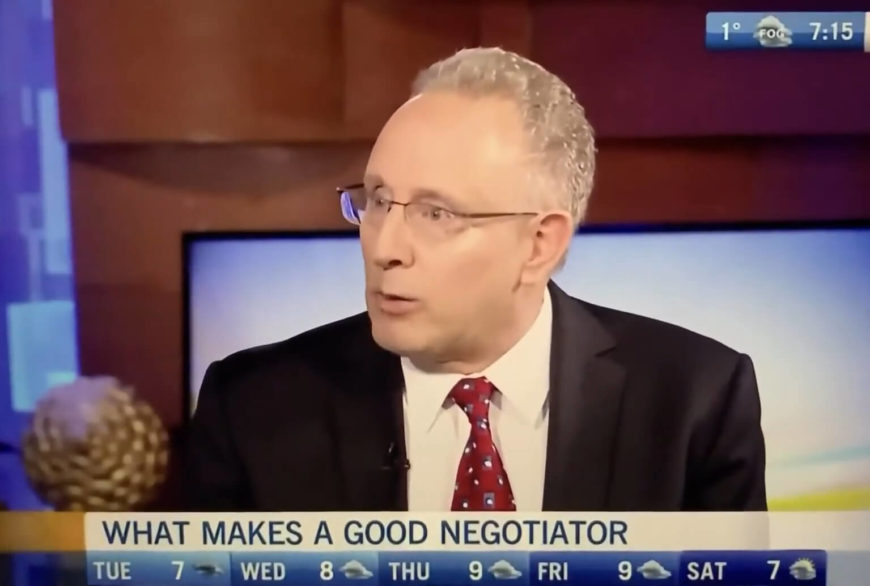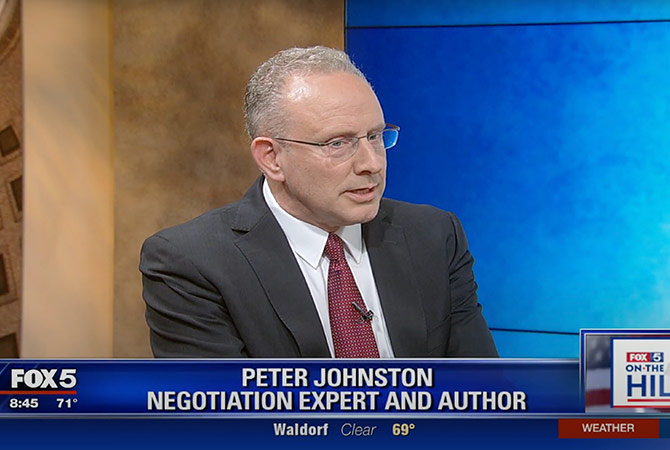Media Coverage
Our work, perspectives, and publications at Negotiation Advice International (NAI) have been featured in news media, blogs, and podcasts around the globe. As one of the world’s foremost negotiation experts, NAI’s Managing Director, Peter D. Johnston, has commented on newsworthy negotiations and volatile conflicts, as well as influence issues related to the economy, politics, and personal relationships. He has also penned high-profile opinion pieces. USA TODAY, for example, has published op-eds by Peter on subject matter ranging from US-China trade issues, to which President Donald Trump reacted on his Facebook page, to best practices in negotiating with children.
Other media have focused on in-depth conversations with Peter related to everything from salary negotiations and labor-management negotiations to advice for negotiating the sale of a small business, and analyzing President Donald Trump’s negotiation style. Peter’s perspectives are driven by Negotiation Advice International’s unique and comprehensive experience successfully applying our distinct methodologies across all these contexts, in addition to wars, mergers & acquisitions, buyer-supplier negotiations, and all forms of asymmetric negotiations – a field we pioneered.
The dozens of news organizations that have interviewed Peter, quoted him, or published his opinion pieces include: ABC’s “America This Morning,” Business Week, CBS Radio, CNN, CTV’s Canada AM, Embassy News, FOX News, Oprah & Friends, South China Morning Post, The Globe and Mail, The National Post, The Wall Street Journal, USA TODAY, US News & World Report, and Wired Magazine.
Peter’s results have been formally recognized by the US Government for their positive economic and social impact, both domestically and abroad. The early foundations for his distinct approaches to influence were formed by working closely with the founders of the Harvard Negotiation Project, the Program on Negotiation, and the Harvard Negotiation Roundtable. A former journalist and corporate & investment banker, he is a graduate of the Harvard Business School. Peter is Canadian and divides his time between Canada and the United States, as well as the East and West Coasts.
—Harvard Business School, Bulletin Magazine
—CNN News
—Jonathan Ferguson
Award-Winning Journalist & Former Editor, The Toronto StarPeter Johnston Media for His First Book
Peter’s first book, Negotiating with Giants, quickly drew media attention and became an international bestseller, kicked off by advance copies being included in SWAG bags given to stars attending the Screen Actors Guild Awards in Hollywood. After being translated to Mandarin, Negotiating with Giants started flying off bookshelves across China as well. As the first to delve into the dynamics and strategies of smaller players negotiating effectively with much larger forces across history, Peter’s book has become a classic — a playbook drawn upon by negotiators worldwide to help even the playing field when dealing with huge counterparts.

Negotiating with Giants
by Peter D. Johnston
—CNN News
—The National Post
—Embassy Magazine
Peter Johnston Media for His Second Book
Peter’s second book, Weapons of Peace, broke new ground as a work of fiction inspired by two true stories, attracting widespread media interest and awards. Peter wrote this novel at night over the course of seven years, after spending his days advising clients, to broaden the market for his messages about negotiation and its importance to both our daily lives and world events.
Weapons of Peace races from an ancient English castle and a bizarre killing in Washington, DC, to a scorched atomic test site in Germany and hidden passages forged under Berlin by resisters plotting to murder Hitler. Peter’s expert hand blends real-world historical material with heart-pounding action, unforgettable characters, and precious insights into influence and how the Nazis negotiated their way to power and kept it.
This novel is the first of its kind, a work of fiction that delves into the art and science of negotiation and influence, exposing readers to the rarified air of international deal-making amid the highest stakes imaginable. Like John Grisham, who incorporates the law and lawyers into his popular books, Peter does the same for negotiation, weaving his own unique expertise into the pages of Weapons of Peace while relaying the startling real-life story of the Nazis’ quest to beat the Allies to the bomb.

Weapons of Peace
by Peter D. Johnston
—Megan Weiss,
Reviewers Choice Awards—Kevin Fletcher
Author, "When It Matters Most"—Barbara J. Falk
Political Philosopher, and Legal Scholar
Peter Johnston News and Op-Eds
As noted above, NAI’s Managing Director, Peter D. Johnston, has been interviewed and cited by dozens of news media worldwide. In celebration of Father’s Day, Peter shared his views on negotiating with children with readers of USA TODAY in the op-ed below.

Peter Johnston News and Op-Eds
As noted above, NAI’s Managing Director, Peter D. Johnston, has been interviewed and cited by dozens of news media worldwide. In celebration of Father’s Day, Peter shared his views on negotiating with children with readers of USA TODAY in the op-ed below.

Don't dictate to your kids. Negotiating has more impact and gives them tools for life.
Encourage your children to challenge your thinking and try to stay neutral about theirs. They’ll keep sharing and learn how to negotiate with anyone.

Peter D. Johnston
Opinion contributor
“What should I be when I grow up?” the 7-year-old boy asked, looking up at his grandfather.
The retired engineer paused. “I’d like you to be wise, Stevie,” he said. The boy nodded and ran out of the kitchen — just as his incredulous father entered from another doorway.
“Dad, I overheard what you just told Stevie! How could you screw that up? The answer was ‘engineer.’ Remember? The same answer you gave me at that age.”
“I like my answer,” the older man said quietly. “After all, a wise person is mindful, kind, patient and knows what matters. How could I want anything more for my grandson?”
“But you told me ‘engineer.’”
The grandfather smiled. “I guess I’m wiser now than I was back then.”
Anytime you’re trying to influence your kids to do or be something, you’re negotiating, whether you think of it that way or not.
Many parents have concerns about negotiating with children, as opposed to just telling them what to do. Yet one of the best gifts you can give your son or daughter is to role-model effective influence and engage in negotiations with them from the youngest age.
Negotiating works better than dictating
By doing so, you’ll not only be able to better influence them and their choices, but they’ll be more inclined to follow through on their agreements with you. Studies and best practices show that when you explain your underlying interests — your goals, needs or concerns — without being positional and forcing kids to do something, they’re more likely to take what you say to heart, internalize it, and then comply, even when you’re not around.
This interest-based approach to influence applies to any concerns you might have about drugs, school, sex, technology, friends, you name it. It also applies to what you want your children to be when they’re older: do you focus on their becoming a doctor, lawyer, or engineer like my client with his son Stevie — or are you consistently more interested in their character and integrity? I’d test my young children to emphasize our priorities as parents: “So, if you become a lawyer, but you cheat your clients or help them cheat others, are you proud of you?”
In negotiating with children, you’ll also want to ask what they care about. Just the act of listening to their goals, needs and concerns without judgment can bring you closer and head off conflicts. Then you can explore different options for meeting both your interests and theirs. Independent standards, such as best practices, rules and laws, and how other families handle similar issues, can help guide which options for agreement make the most sense.
Negotiating doesn’t mean you won’t often reserve the right, especially with younger children, to make a final decision yourself as the parent instead of giving them what they want. In one experiment I organized, a father and mother in a store watched their wailing toddler fall to the floor and shout because they wouldn’t buy her candy. The embarrassed parents quickly caved in.
When I asked a group of school children to analyze the situation, one young girl scolded the parents, saying, “You just taught your daughter to fall on the ground and cry when she wants something. You should never give in like that when she’s so unreasonable, or she’ll do it every time…trust me, I know!”


Ask questions instead of imposing your views
With kids of all ages, asking questions can be the best way to get them thinking, internalizing lessons that stand the test of time: “What concerns do you think we might have about your going to a party without any adults around?” Likewise, letting them ask you questions, though sometimes awkward, can empower them and hold you accountable.
“Dad,” my daughter once asked me, “why do you think it was appropriate to say that in front of my friends?” If you suck it up, keep an open mind and answer that question thoughtfully, you’re role-modeling how to have a tough conversation, and quite possibly, how to admit a mistake.
When your children are making decisions, think about teaching them how to make decisions, rather than imposing your views on them which a) tends to send them in the other direction, and b) won’t help them during the 60-plus years they’ll be living away from home. For example, show them how to create a list of pros and cons.
Avoid judgments and encourage pushback
The more you help with the decision process, while staying neutral, the more likely they’ll be influenced to share the tough choices they will face in the future. This discipline to not judge is one of the toughest aspects of parenting. If you judge often and harshly, they’ll stop sharing, and their sharing is your best way to keep communication lines open and build trust.
So, negotiate with your kids. Encourage them to push back on your thinking, probing interests, options and relevant standards.
One day they’ll thank you for it when they realize the gift you’ve given them. A gift that will help them get what they want out of life and improve their relationships. A gift, from their parents — the first authority figures in their lives — that will prove vital when future authority figures, such as demanding or unethical bosses, ask them to do inappropriate things. They’ll know much better how to respond. Because they’ll have learned who they want to be, not what, and you’ll have given them the tools, practice and confidence to negotiate with anyone.
Peter D. Johnston, a father of two college-age children, is a negotiation and influence expert and author of Negotiating with Giants and the historical thriller Weapons of Peace.




